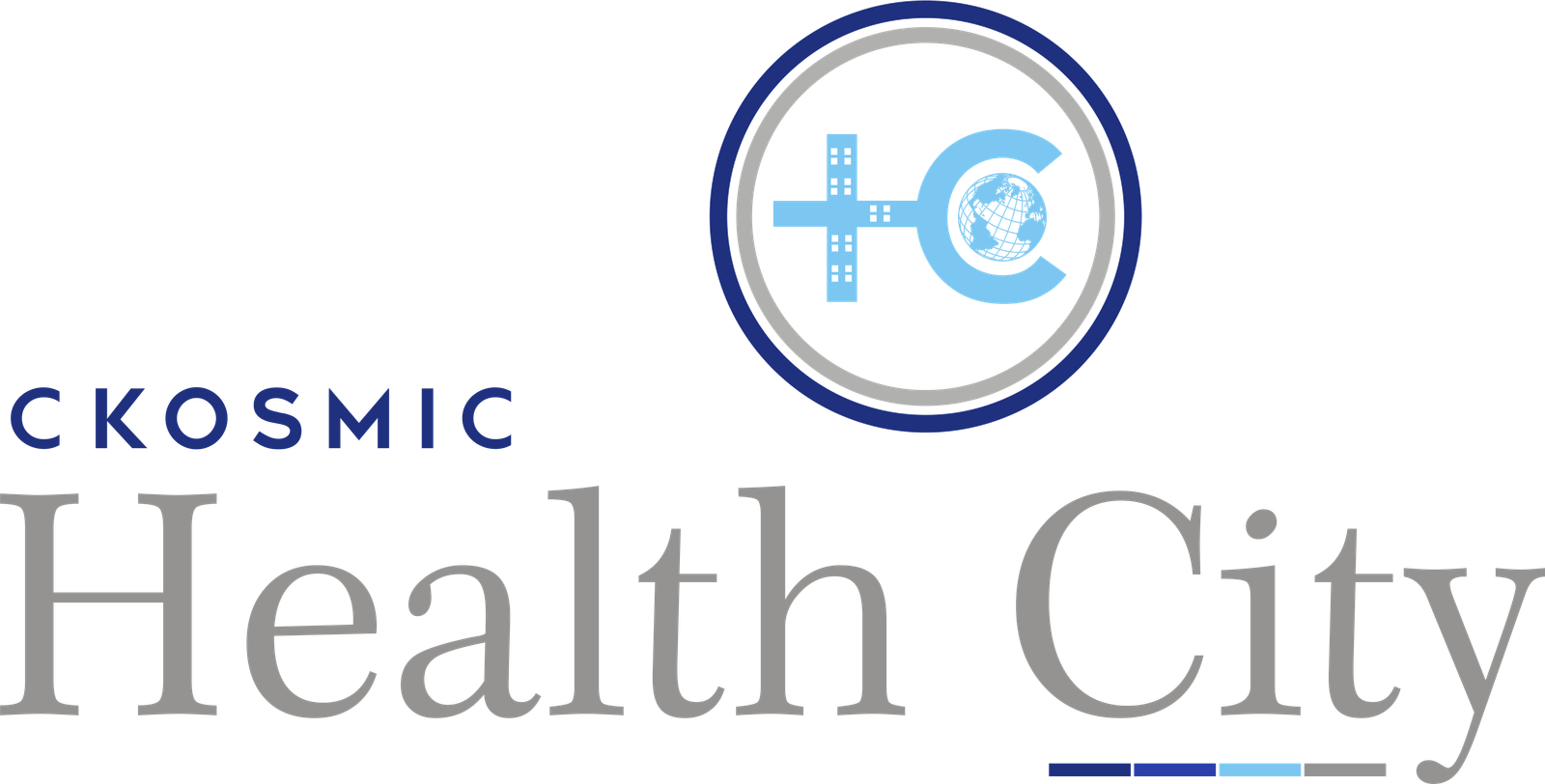Weight Loss Surgery in Hoshiarpur
Excessive weight is one of the main risk factors for the development of diabetes, hypertension and cardiovascular diseases. Fortunately, right amount of weight loss usually improves or eliminates these conditions. However, when those and other methods have failed, Dr Amit Sood who is the Best Bariatric Surgeon in Hoshiarpur at Ckosmic Surgical Center can help you achieve substantial weight loss through a variety of procedures which are as follows:
- Roux-en-Y Gastric Bypass (pronounced “Roo-N-Why”)
- Adjustable Gastric Band
Dr Amit Sood Is the Best Bariatric Surgeon in Hoshiarpur and also have experience with a number of less common procedures, including:
- Biliary pancreatic fun
- Gastric sleeve resection
Long-term studies show that patients undergoing bariatric surgery can achieve percentage losses ranging from 25% to 80% of excess body weight, recovery from diabetes, improvement in cardiovascular risk factors, and a reduction in mortality of almost half.
How does bariatric surgery work?
Weight loss surgeries work by restricting the amount of food you eat and/or altering your body’s ability to absorb food. Overeating is curbed because exceeding the stomach’s capacity or eating high-fat foods causes nausea and vomiting. The two most common procedures are:
Roux-en-Y Gastric Bypass
Gastric bypass can be performed as an open or minimally invasive (i.e., laparoscopic) procedure. The surgeon creates a small stomach pouch and bypasses part of the intestine, restricting both the amount of food he eats and the opportunity for food to be absorbed.
Adjustable Gastric Band
Generally performed as a minimally invasive surgery, gastric banding involves placing a band around the upper part of the stomach. This band divides the stomach into a small upper pouch and a larger lower pouch. You feel full sooner as the top bag is small. Therefore, it works by only restricting the amount of food you eat. As the name implies, your surgeon can adjust the band through a port placed under the skin to ensure proper weight loss.
Is bariatric surgery right for me?
The US National Institutes of Health recommends bariatric surgery for obese people with a BMI of at least 40, and for people with a BMI 35 and coexisting serious medical conditions, such as diabetes. Any surgical procedure carries some degree of risk that must be considered in decision making, but the overall risk of remaining morbidly obese generally outweighs the surgical risks. Still, bariatric surgery cannot be considered as a “magic pill”. To achieve significant and permanent weight loss, you must be prepared to exercise and follow a restricted diet (the level of restriction varies depending on the type of surgical procedure) for the rest of his life. If you can’t make that kind of commitment, you probably won’t lose the weight you want.
What type of weight loss surgery is best?
Ultimately, the right bariatric procedure for you is the one that will help you safely achieve your weight loss goals. While gastric bypass is believed by many to allow faster and more significant weight loss, it is also irreversible and often requires a longer recovery period both in and out of the hospital. Additionally, gastric bypass surgery patients must be even more careful about adhering to a strict diet than those undergoing gastric banding (although both generally require a high-protein, low-fat, nearly alcohol-free diet). As a result of these factors, the LAP-BAND and other gastric band procedures have increased in popularity. But recent studies have shown that successful weight loss depends more on an individual’s willingness to exercise and follow a healthy nutritional plan. Dr Amit Sood and others at the Ckosmic Surgical Center will explain the details to you and help you select the procedure that is best for you.
Post-Surgery
The care you receive after surgery is just as important as the skill and experience of the surgeon. At the Ckosmic Surgical Center, a team of doctors, nurses, nutritionists, psychotherapists, exercise consultants, and others manage every aspect of your recovery and ongoing weight loss. These caring professionals work together to help you adjust to the lifestyle changes associated with bariatric surgery and monitor your health as you move toward your weight loss goals.
Weight Loss Surgery in Hoshiarpur- Testimony Gallery
Print Media
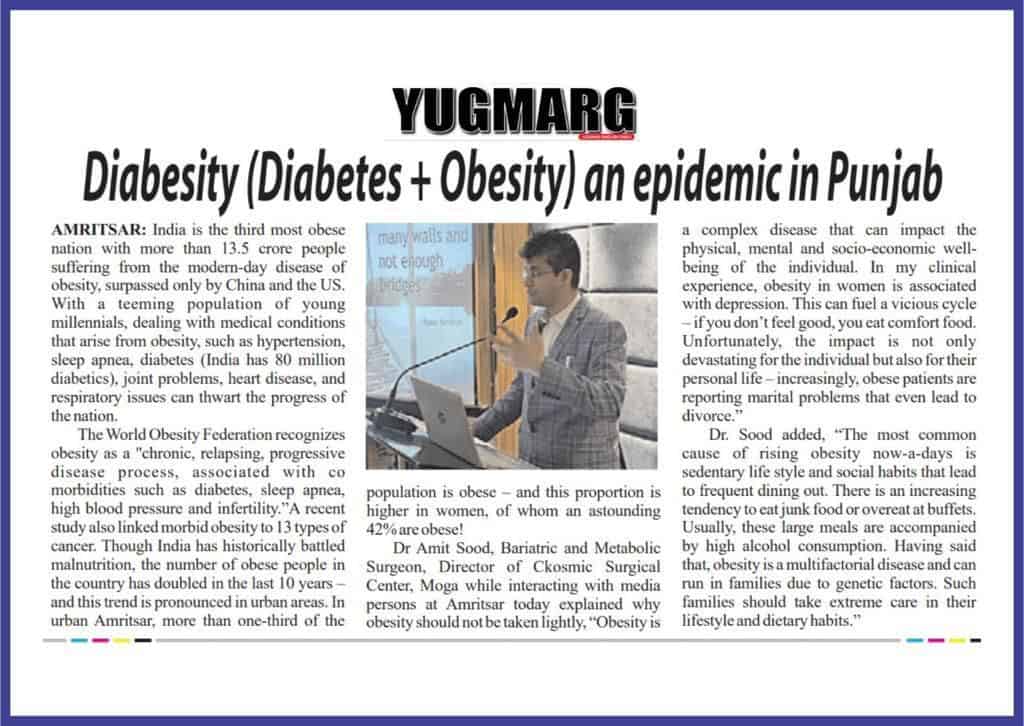
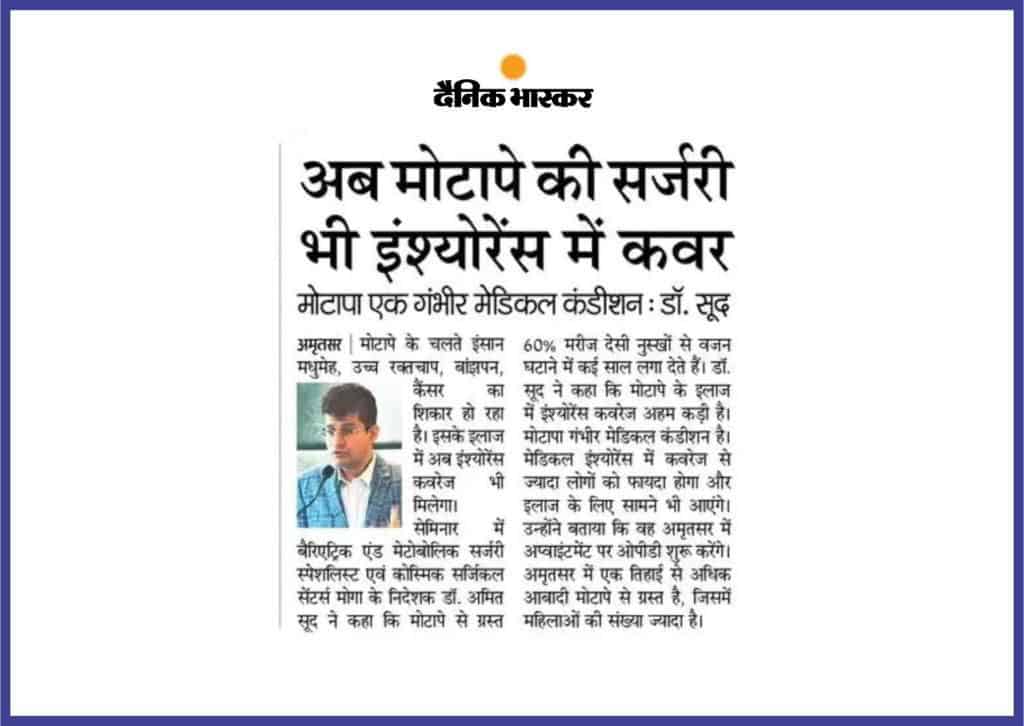
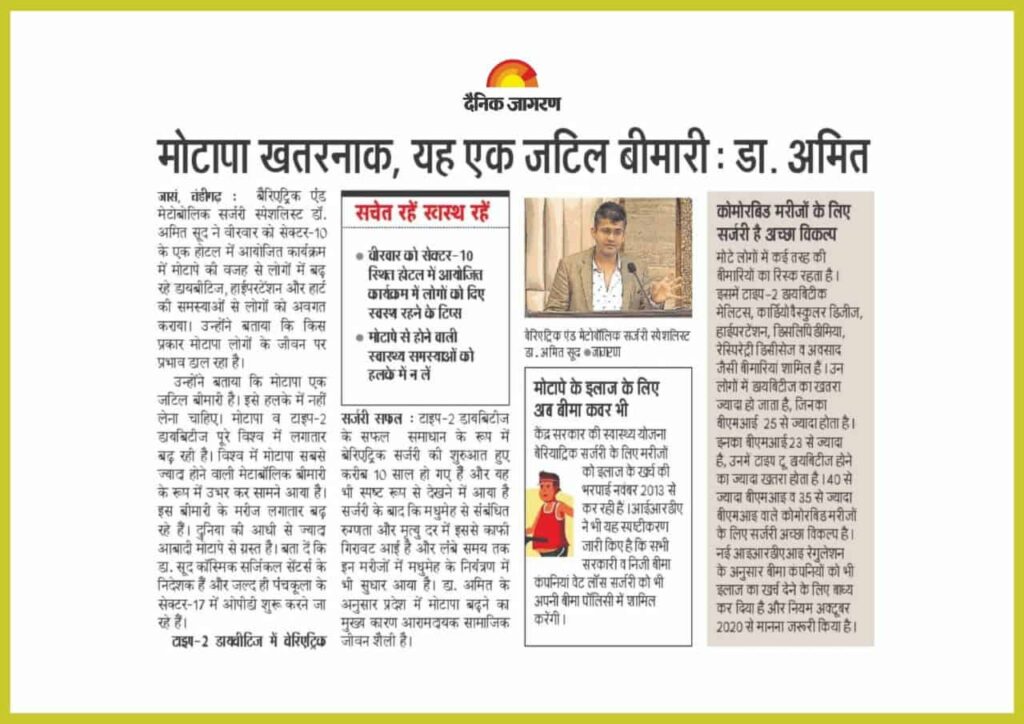
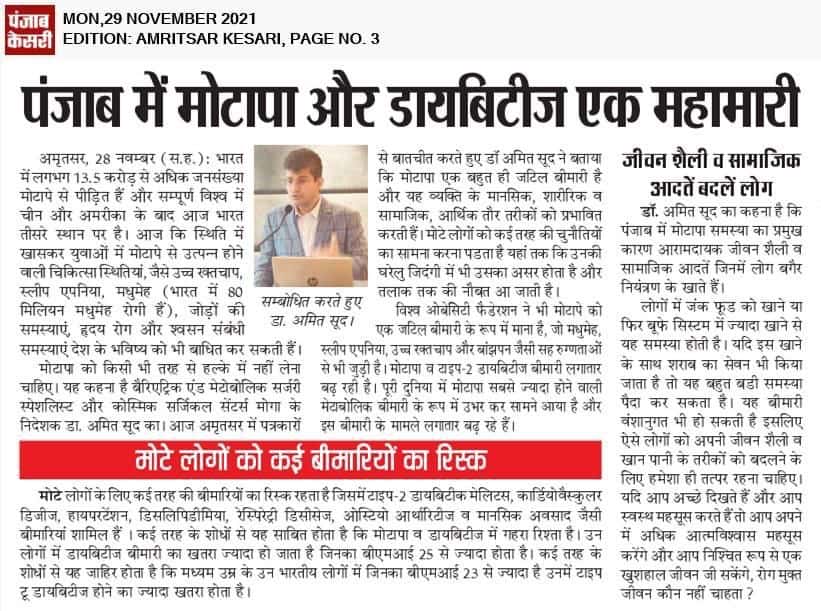
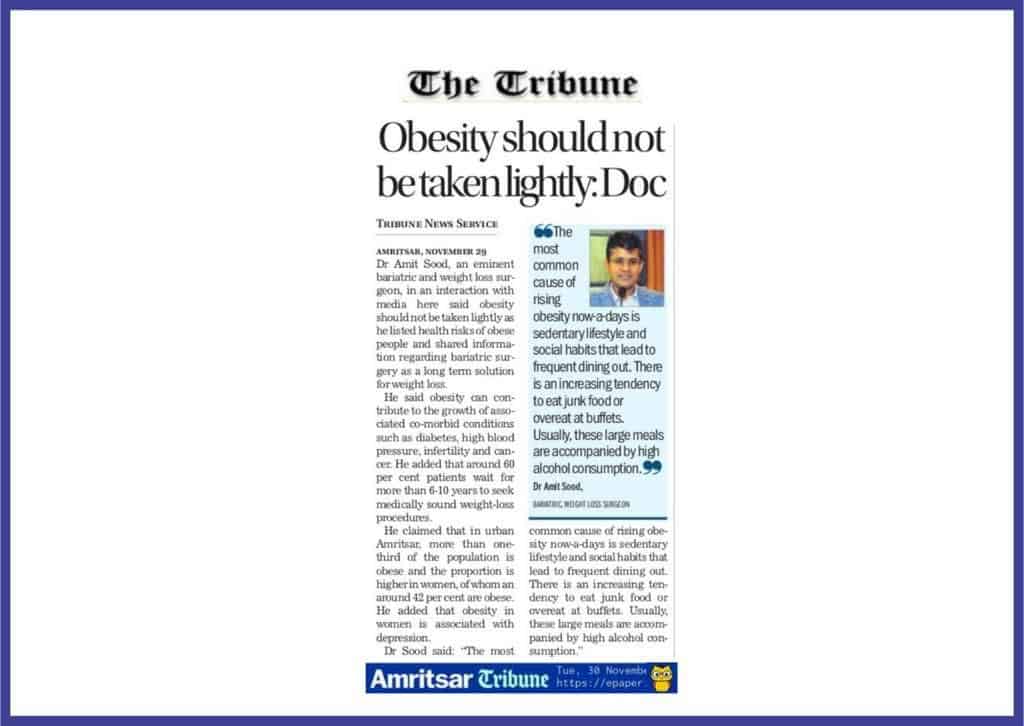
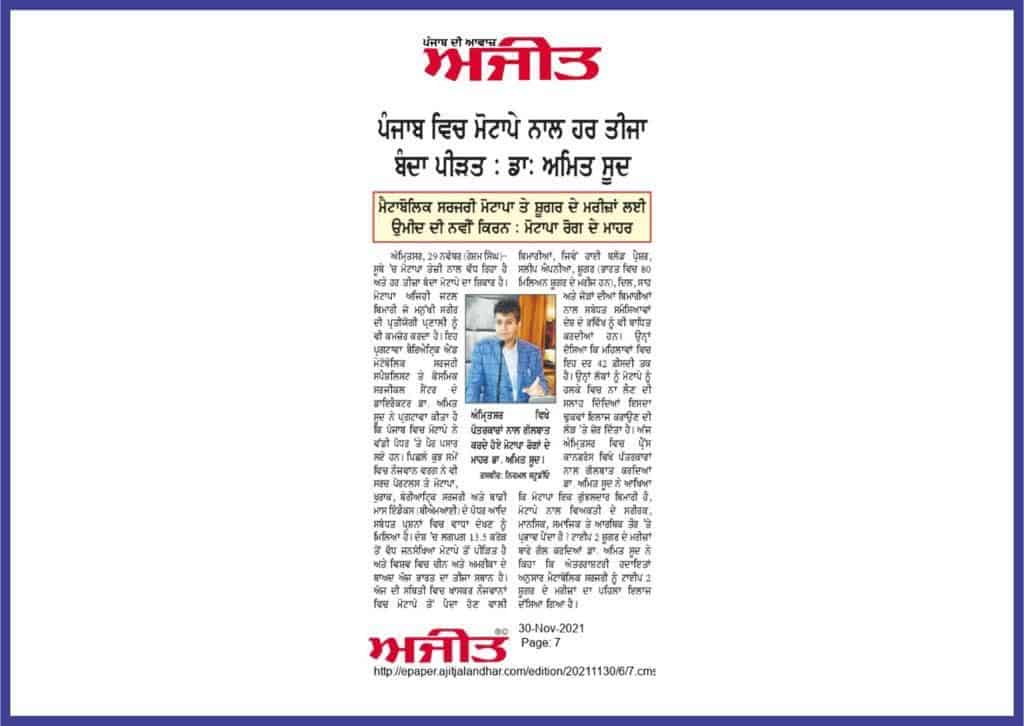
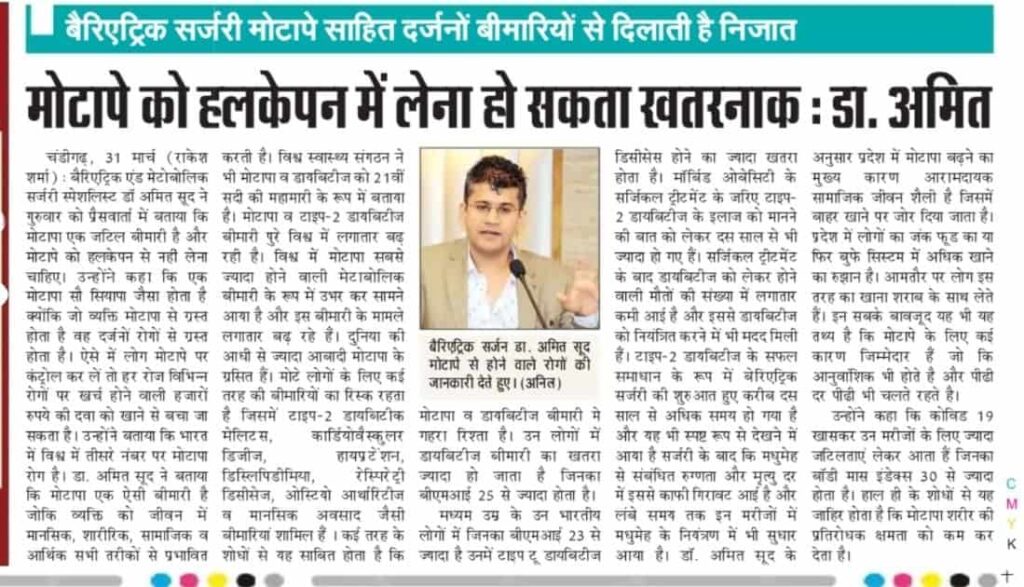
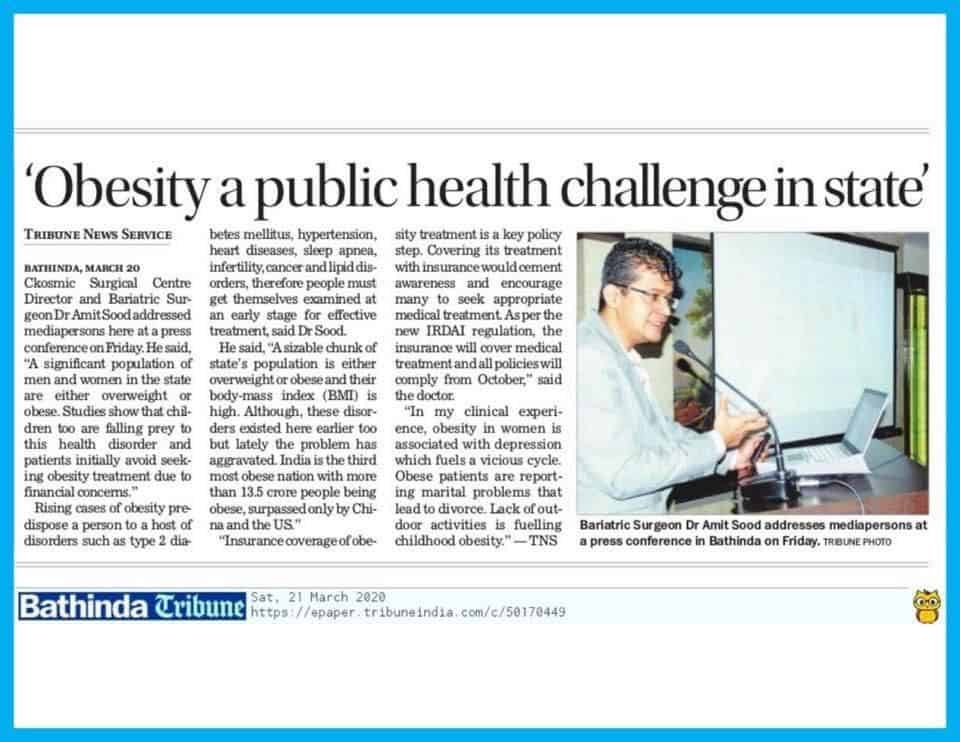

Weight Loss Surgery Cost in Hoshiarpur
Weight Loss Surgery Cost –
- Estimated Cost for Weight Loss Surgery :
- Clinic Timings:
- Working Days:
- Contact Number:
Details:
- ₹2 Lakh to ₹2.5 Lakh (Tentative)
- 9:00 AM to 6:00 PM
- Monday – Saturday
- P. (+91) 73411-01891, P. (+91) 73411-01892
Note: The actual cost may vary based on patient-specific conditions and medical requirements.
About The Surgeon
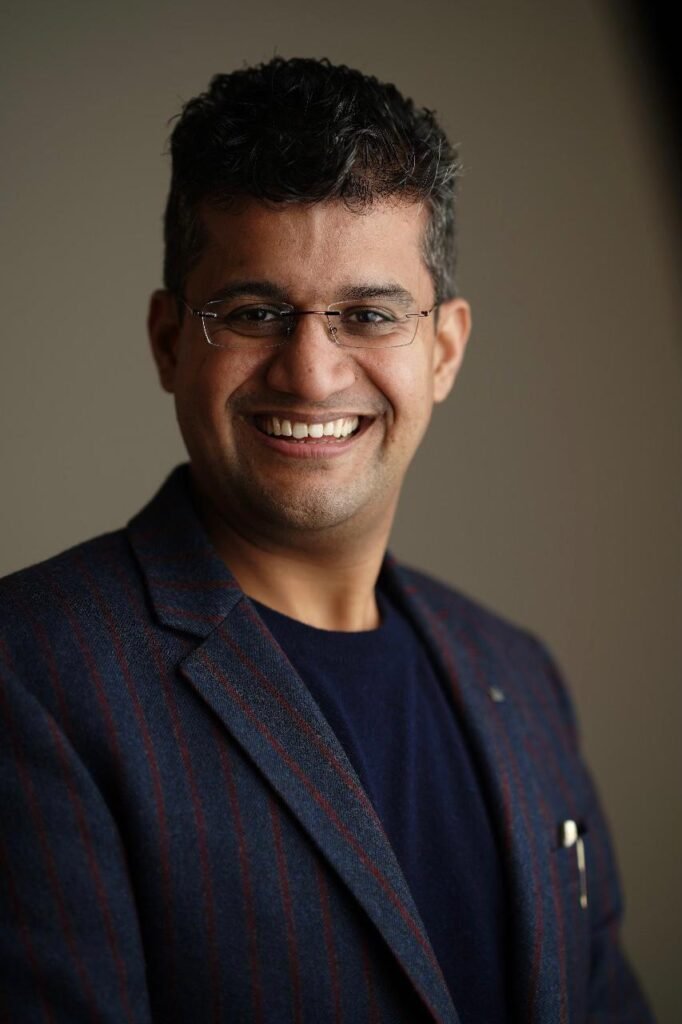
Dr. Amit Sood
MBBS , MS , DNB , F GI & HPB , MAS , MARS
Minimal Access , Bariatric , Metabolic and Endoscopic Surgeon
Dr. Amit Sood, who is the Founder & Director of CKOSMIC SURGICAL CENTER and his experience forms the core of the organization. He is one of the youngest Minimal Access, Bariatric, Metabolic, Laparoscopic and Endoscopic Surgeon in India and has also been awarded with a Gold Medal in surgery.
- M.B.B.S at Jawahar lal Nehru Medical College, Belgaum.
- Master of Surgery MS at Sri Ramachandra University, Chennai.
- DNB Studied at National Board of Examinations, New Delhi
- F-GI & HPB surgery at Amrita Institute of Medical Sciences & Research Center, Kochi.
- Minimal Access, Bariatric and Metabolic Surgery at CODS Mumbai.
- Minimally Invasive Surgery at MUHS Nashik
- Honor Code Certificate (Metabolic Applied Research Strategy-MARS) USA.
Frequently Asked Questions (FAQs)
Why is Dr. Amit Sood the best choice for weight loss surgery in Hoshiarpur?
The dedication and successful track record of Dr. Amit Sood make him the best weight loss surgeon in Hoshiarpur. He is fully dedicated to offer pre and post operative care to the patients for faster recovery and long term results.
How do I schedule a consultation with Dr. Amit Sood for weight loss surgery?
You can schedule a consultation with Dr. Amit Sood by visiting the official website to fill out a form or giving us a call at (+91) 73411-01891, (+91) 73411- 01892, or visiting Coksmic Health City for an in-person consultation.
How much weight loss can I expect after the bariatric surgery?
The results after weight loss surgery mostly vary with the diet and exercise followed after the surgery. The choice of a particular weight loss surgery also affects the results. Most of the patients can expect:
- Sleeve Gastrectomy: 60-70% of excess weight in 12-18 months
- Gastric Bypass: 70-80% of excess weight in 18-24 months
How long does the surgery take, and what is the recovery period?
Most of the weight loss procedures take 1-3 hours (laparoscopically). The patients generally stay 2-3 days in the hospital and can resume light activities in 1-2 weeks, with full recovery in 4-6 weeks.
